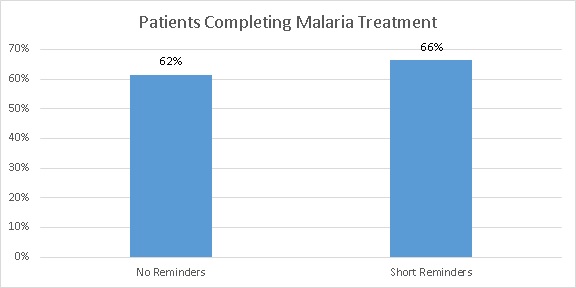
Text Messages: “Please Take Your Malaria Drugs!”
Organization : Innovations for Poverty Action
Project Overview
Project Summary
Malaria patients received regular text messages reminding them to complete the full course of treatment.
Impact
Reminders produced a 5 percentage point increase in medication adherence.
Cost
The reminders cost about $0.01 per text message.
Challenge
Malaria patients undertaking artemisinin-based combination therapies (ACTs) must complete their full, six-dose course of medication over two and a half days to avoid relapse into illness and prevent the development of drug-resistant strains of the disease. However, many people stop taking the drugs once they feel better. There is evidence that P. falciparum, the strain responsible for the majority of deaths in Sub-Saharan Africa, has developed resistance to ACTs in Southeast Asia. Public health experts are deeply concerned that resistance will also develop and spread in Africa, where the parasite has already developed widespread resistance to several classes of antimalarial drugs, leaving ACTs as the only fully effective treatment.
Design
People receiving treatment for malaria received a text message every 12 hours, around breakfast and dinner time, over the course of two and a half days for each of the six doses of ACT. The messages reminded them to take their malaria drugs; they either read “Please take your MALARIA drugs!” or “Please take your MALARIA drugs! Even if you feel better, you must take all the tablets to kill all the malaria.”
Malaria patients were recruited from public and private hospitals, clinics, pharmacies, licensed chemical sellers, and other places where ACTs were legally sold over the counter, and given instructions in how to enroll in a mobile malaria information system.
Impact

A randomized evaluation found that simple text message reminders increased the number of malaria patients who completed ACT treatment by 5 percentage points: 66.4% completed treatment, relative to 61.5% of those who didn’t receive any reminder messages. Receiving a longer message did not significantly increase adherence.
What worked best
- Remind women: The reminders more than doubled the odds of adherence among women but did not have a statistically significant impact on adherence among men.
- Remind patients at private clinics: Among participants from private clinics, the text message reminder increased completion by 14 percentage points, whereas among patients from public hospitals, the increase was less than 2 percentage points in relation to those who didn’t receive reminders.
Adherence was assessed by checking pill packages of ACTs at the patient’s home.
Implementation Guidelines
Inspired to implement this design in your own work? Here are some things to think about before you get started:
- Are the behavioral drivers to the problem you are trying to solve similar to the ones described in the challenge section of this project?
- Is it feasible to adapt the design to address your problem?
- Could there be structural barriers at play that might keep the design from having the desired effect?
- Finally, we encourage you to make sure you monitor, test and take steps to iterate on designs often when either adapting them to a new context or scaling up to make sure they’re effective.
Additionally, consider the following insights from the design’s researcher:
- Basic conditions: Literacy (i.e., the ability to read the text messages), high mobile phone saturation, and reliable mobile networks, are prerequisites for program effectiveness. Implementers should also consider the population’s familiarity with text messages. In northern Ghana, mobile phones were common but texting wasn’t. The results might be different (better or worse) in settings where texting is more common.
- Enrollment: Having pharmacy (or other vendor) staff enroll people at the time they received the drugs worked well in this study. Preliminary qualitative research for this study also indicated that it was important to participants that they not incur a cost for the program. The study enabled patients to enroll in the program by texting or by “flashing,” a no-cost practice of calling someone and hanging up before they pick up, which is common in Ghana. All but one patient in the study enrolled through flashing.
Would this work elsewhere?
- In response to this evidence, a new organization called TextDirect is scaling up the approach in Sierra Leone.
- Other evidence supports the effectiveness of reminders: text message reminders to take another medication, anti-retroviral therapies, have increased adherence in Kenya and Cameroon.[1] This evidence suggests that text message reminders to complete a full course of medication can be an effective strategy in contexts where adherence is a problem.
Messaging Platforms
The research team hired a programmer who wrote computer code to randomize delivery of the text messages off of a server, but they encountered technological challenges such as the server not responding and electricity outages in Ghana. Now that the concept has been demonstrated, text reminders could be implemented at scale by working with companies that specialize in text messaging programs. There is one based in Ghana called VOTO Mobile (https://www.votomobile.org/) and another that runs in many countries called Telerivet (https://telerivet.com/). The research team also recommends partnering with the Ministry of Health to make text message reminder programs larger scale and more sustainable.
Project Credits
Researchers:
Gunther Fink Contact Harvard School of Public Health
Heather Lanthorn Harvard School of Public Health
Julia Goldberg Raifman Harvard School of Public Health
Slawa Rokicki Geary Institute for Public Policy, University College Dublin
[1] Mbuagbaw, L., Kop, M.L. van der, Lester, R.T., Thirumurthy, H., Pop-Eleches, C., Ye, C., Smieja, M., Dolovich, L., Mills, E.J., Thabane, L., 2013. Mobile phone text messages for improving adherence to antiretroviral therapy (ART): an individual patient data meta-analysis of randomised trials. BMJ Open 3, e003950.


